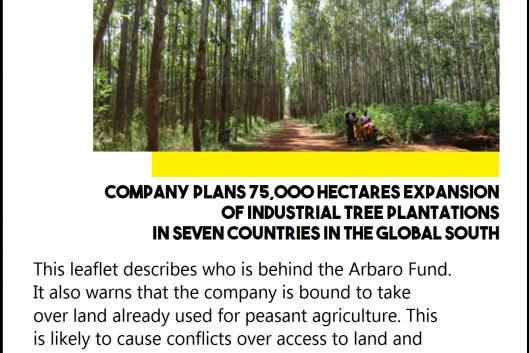(Disponible uniquement en anglais et espagnol).
Company plans 75,000 hectares expansion of industrial tree plantations in seven countries in the Global South: Sierra Leone, Ghana, Uganda, Ethiopia, Peru, Ecuador and Paraguay.
This leaflet describes who is behind the Arbaro Fund. It also warns that the company is bound to take over land already used for peasant agriculture. This is likely to cause conflicts over access to land and pollution of water as a result of the use of agrotoxins in their monoculture plantations.
>>> Download it to read on screen
>>> Download it to print (2 pages per A4 sheet)
CONTENTS:
1. Arbaro’s plans
2. Who is behind the Arbaro Fund?
3. More conflicts and community hardship ahead as result of Arbaro’s investments?
In February 2020, a company called Arbaro Fund received 25 million US-dollars from the Green Climate Fund for the expansion of industrial tree plantations in seven countries in the global South. Before applying for those 25 million US-dollars, Arbaro had already secured 60.2 million US-dollars, including 30 million US-dollars from public banks (“development banks”). With the 25 million US-dollars in public money from the Green Climate Fund, Arbaro hopes to secure even more money in the future and create 75,000 hectares of industrial tree plantations in Sierra Leone, Ghana, Uganda, Ethiopia, Peru, Ecuador and Paraguay.
In Sierra Leone and Ghana, Arbaro Fund is already involved in industrial tree plantations, through a partnership with a company called Miro Forestry Developments Ltd (UK). In Paraguay, Arbaro Fund controls a tree plantation company called Forestal Apepú SA. The Arbaro Fund co-Founder, a company called Unique, also already runs a large-scale eucalyptus tree plantation project in Paraguay, through an investment in a company called PAYCO.
When Arbaro Fund applied for the Green Climate Fund money, it only named the countries where it aims to invest in expansion of industrial tree plantations. This suggests that the company has not secured the land yet. It also means that the company is still deciding which already existing plantation companies they will be working with to expand already existing plantation areas in the seven countries they plan to invest in.
Communities affected by industrial tree plantations have often shared the message that it is easier to stop plantations and prevent the conflicts they cause before the trees are planted and much harder to get rid of them once the trees have been put into the ground.
This is therefore an important moment for community organisations and activists in the countries that Arbaro has identified as destination for their investments. They must be alert when consultants come searching for land, start talking of “restoring degraded” community land and visit community leaders to present their proposals.
